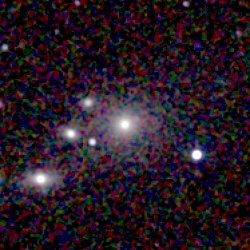NGC 7012
| NGC 7012 | |
|---|---|
 In this picture by the 2MASS survey, NGC 7012 is surrounded by 3 smaller galaxies. The star is also visible at the lower right. | |
| Observation data (J2000 epoch) | |
| Constellation | Microscopium |
| Right ascension | 21h 06m 45.5s[1] |
| Declination | −44° 48′ 53″[1] |
| Redshift | 0.029347[1] |
| Helio radial velocity | 8,798 km/s[1] |
| Distance | 381,654,000 ly |
| Apparent magnitude (V) | 13.65[1] |
| Characteristics | |
| Type | E4 pec[1] |
| Apparent size (V) | 2.5 x 1.4[1] |
| Other designations | |
| ESO 286-51, AM 2103-450, PGC 66116[1] | |
NGC 7012 is a large, bright[2] elliptical galaxy located about 380 million Light-years away from Earth in the constellation Microscopium[3][4] NGC 7012 was discovered by astronomer John Herschel on July 1, 1834.[5]
Abell S0921[]
NGC 7012 is the brightest member in the center of a small compact group of interacting galaxies[6] known as .[7] Due to it also being the dominant member of the group, NGC 7012 is classified as a Cd galaxy.[8] The group has about seven major galaxies with many other more distant, fainter galaxies that are probably also associated.[2]
See also[]
References[]
- ^ a b c d e f g h "NASA/IPAC Extragalactic Database". Results for NGC 7012. Retrieved 2017-05-13.
- ^ a b "NGC/IC Project Restoration Efforts". www.ngcicproject.org. Archived from the original on 2017-09-10. Retrieved 2017-05-13.
- ^ Rojas, Sebastián García. "Galaxy NGC 7012 Deep Sky Objects Browser". DSO Browser. Retrieved 2017-05-11.
- ^ "Your NED Search Results". ned.ipac.caltech.edu. Retrieved 2017-05-13.
- ^ "New General Catalog Objects: NGC 7000 - 7049". cseligman.com. Retrieved 2017-05-08.
- ^ "ACO S 921". SIMBAD. Centre de données astronomiques de Strasbourg. Retrieved 2017-05-18.
- ^ "Your NED Search Results". ned.ipac.caltech.edu. Retrieved 2017-09-10.
- ^ "Detailed Object Classifications". ned.ipac.caltech.edu. Retrieved 2017-11-14.
External links[]
- NGC 7012 on WikiSky: DSS2, SDSS, GALEX, IRAS, Hydrogen α, X-Ray, Astrophoto, Sky Map, Articles and images
Categories:
- Astronomical objects discovered in 1834
- Microscopium
- NGC objects
- Elliptical galaxies
- Principal Galaxies Catalogue objects